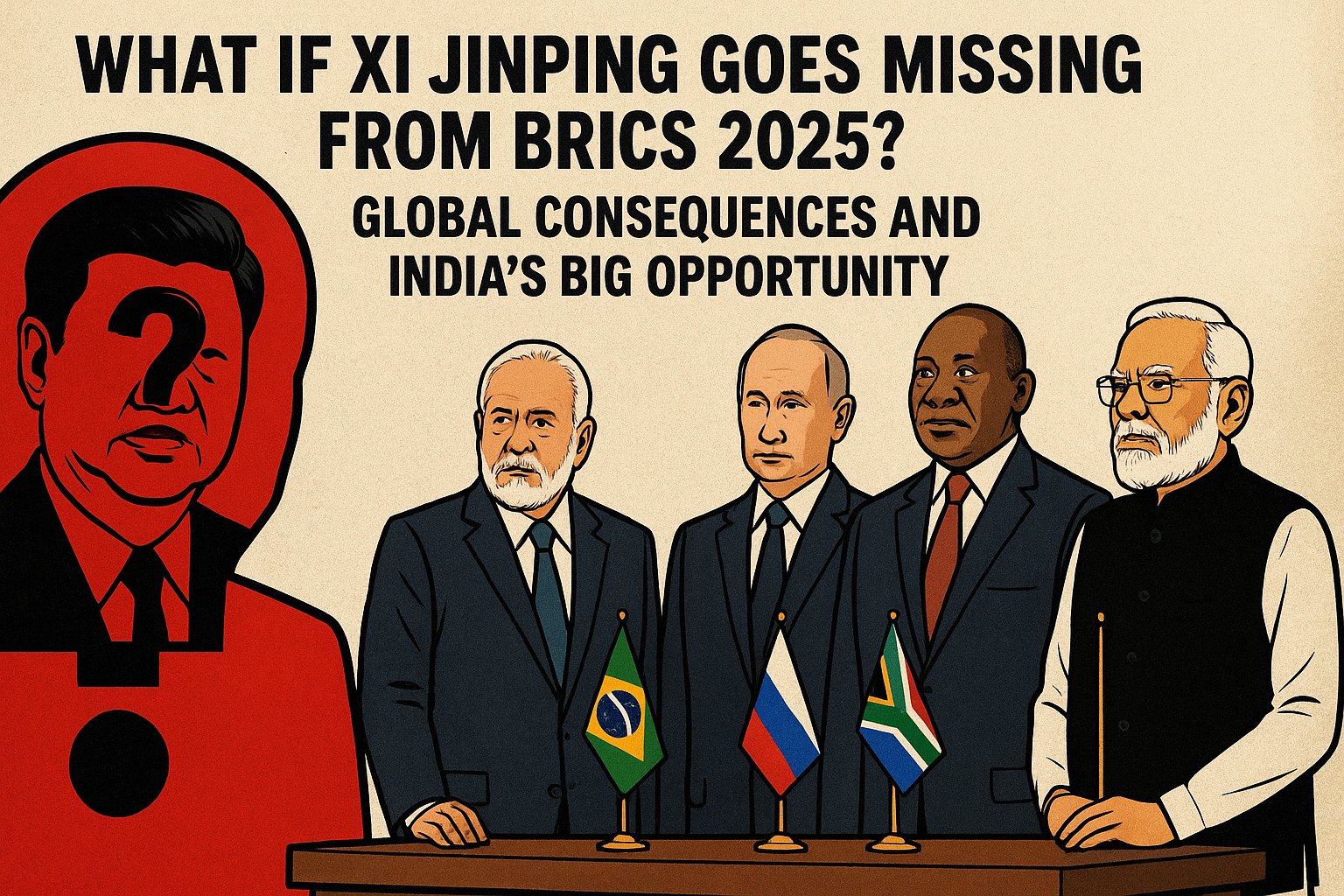Unprecedented Absence at the BRICS Summit
What If Xi Jinping Goes Missing from the BRICS summit? This hypothetical highlight of his absence at Brazil would send seismic ripples through global diplomacy. Xi has attended every summit since 2009, so if he skipped the 2025 summit, it would be the first such incident in over a decade. With Russian President Vladimir Putin already out, Xi’s absence would leave only President Lula da Silva (host), India’s Narendra Modi, and South Africa’s Cyril Ramaphosa present among historic leaders.
The resulting void would raise urgent questions:
- Why did Xi Jinping go missing at BRICS? Was it a health issue, a carefully calibrated political signal, or a diplomatic slight?
- What does it mean for BRICS cohesion and global geopolitics?
- How would this affect India?
1. A Strategic Diplomatic Signal
If Xi Jinping goes missing without a credible excuse, analysts would likely interpret it as an overt diplomatic gesture. China might be indicating:
- A reticence to engage on global platforms—possibly pushing a domestic-focused agenda or expressing displeasure with how the summit is structured.
- A tacit rebuke to Brazil or Vietnam protocols that may not have accorded China expected priority.
- A demonstration of China’s strategy, emphasizing domestic economic revival or highlighting internal policy changes.
A silent no-show, in effect, becomes a strategic loudspeaker.
2. BRICS Cohesion & Multilateral Fallout
BRICS was designed as a coalition of “Emerging Powers”—Brazil, Russia, India, China, South Africa—and now includes nations like UAE, Egypt, and Iran. But What if Xi Jinping goes missing from BRICS, the bloc’s unity may be dramatically weakened:
- Institutional Fragmentation: Without Xi (and possibly without Putin), ambitious multilateral initiatives—including a shared BRICS currency, new development banks, or de-dollarization—could falter.
- Fragmented Strategic Direction: Decision-making would skew toward Brazil or India, limiting China’s shaping influence.
- Structured Drift: If Xi is absent, future summits—like BRICS+ in South Africa or Russia—might similarly be downgraded.
3. Bilateral Relations: India–China Chill
A summit is also a prospect for Modi–Xi diplomacy. Their meeting in Kazan signaled a thaw in 2023. But if Xi Jinping goes missing at BRICS, that momentum could stall:
- Delay in Border Dialogues: Ongoing talks about Kashmir, Sikkim, and other tensions would lose traction.
- Trust Erosion: Beijing halting meaningful interaction would likely be interpreted as diplomatic frostiness.
- India may seek alternative regional partnerships while China refocuses inward.
4. India’s Strategic Gains
Remarkably, Xi’s no-show could generate openings for India:
- India steps into the leadership vacuum. With Xi absent, Narendra Modi could assume the spotlight, showcasing India as the stabilizing BRICS anchor.
- Strengthened ties with host Brazil. Hosting summits increases diplomatic goodwill. Modi’s red carpet receptions may be more pronounced without Xi’s presence.
- Soft power & BRICS pivot: India could nudge newer members (Egypt, Iran, UAE) away from Chinese influence and into Quad or G20 frameworks.
5. Strategic Costs for India
Yet there are downsides if Xi Jinping goes missing from BRICS:
- Reduced diplomatic leverage with China. India misses a chance to directly shape Chinese engagement.
- Stifled BRICS initiatives. Common strategies like currency pools or digital development channels often need China’s full backing.
- Geopolitical rivalries. Podcasts of a stronger China‑Russia alignment could isolate India in a 3 Pillars scenario: China‑Russia, BRICS‑minus‑China, and the global West.
6. Market and Economic Consequences
The global economy could also feel the ripple effects if Xi Jinping goes missing from BRICS:
- Market uncertainty. An absent Xi suggests Beijing is preoccupied—potentially with economic rebalancing. That uncertainty may unsettle global markets, including commodity and currency sectors.
- Foreign investment shift. Investors might reconsider China allocations, pivoting toward India and other Asian markets.
- Supply chain shifts. Western firms may accelerate China-plus manufacturing strategies—benefiting India’s textile, electronics, and auto sectors.
7. Security & Regional Balance
A missing Xi could alter global security postures:
- Reduced triangular diplomacy. Modi-Xi-Putin interactions could stall, weakening efforts to resolve regional crises like Afghanistan or Kashmir.
- Increased Chinese domestic priority. Focus may shift inward to economic stabilization and internal consolidation.
- U.S. & Quad recalibration. A stronger BRICS led by India may prompt the U.S., Japan, Australia to strengthen trade and defense ties.
8. Western and Global Reactions
The West would interpret Xi’s absence as a signal:
- Message to Washington. The U.S. could see this as an opening to deepen India engagement on tech, defense, and trade.
- EU positioning. European leaders may welcome more collaboration with a visibly assertive India.
- Soft power expansion. India might deepen cultural and development projects across Africa, Latin America, and Southeast Asia—while China steps back.
9. Is Xi’s No-Show Plausible?
Could domestic or diplomatic reasons cause Xi to skip? Consider:
- Internal Political Turbulence. Perhaps power shifts at home or economic turbulence demand Xi’s presence in Beijing.
- Wanted to spotlight Li Qiang. Premier Li at BRICS might signal a transition in leadership style—decoupling from Xi-led foreign diplomacy.
- Symbolic withdrawal. Beijing may feel sidelined by Brazil’s or India’s prominence at diplomatic receptions.
10. India’s Tactical & Diplomatic Roadmap
Assuming Xi Jinping goes missing from BRICS, India’s strategy could include:
- Drive early BRICS initiatives. Push shared currency discussions or development bank formations.
- Intensify India‑Brazil diplomacy. Strengthen partnerships in agriculture, defense, healthcare, IT.
- Build on BRICS centrism. Host BRICS‑plus dialogues tapping new entrants.
- Expand Quad alignment. Balance BRICS by deepening science, climate, and tech cooperation with U.S., Japan, Australia.
11. Long-Term Scenario Modeling
| Scenario | India’s Strategic Peak? | Risks |
|---|---|---|
| Xi attends normally | Moderate | Continued India‑China engagement; equitable BRICS leadership |
| Xi attends skirmished | Limited influence | Tensions persist; China‑Russia still dominant |
| Xi skips entirely (world stage) | High—India takes BRICS helm | Erosion of BRICS coherence; Russia may rally new bloc |
12. Conclusion
The absence of Xi Jinping from the BRICS summit—either due to health, domestic pressures, or diplomatic strategy—marks a potential inflection point for India:Pros:
- Runs centerstage at major multilateral meeting.
- Strengthens ties with Brazil and new BRICS members.
- Positions India as global power, attracting investment.
Cons:
- Loses diplomatic access to China within framework.
- Weakens push for BRICS institutionalization.
- Risks opening China‑Russia axis extra-BRICS.
Ultimately, if Xi Jinping goes missing from BRICS, India is positioned to reshape global dialogues, strategically balancing between emerging and developed-world blocs. This is not just a diplomatic twist; it’s a geopolitical fork in the road—and India may well choose to lead.
This is all about What If Xi Jinping Goes Missing

Photo By Manuel Joseph

One thought on “What If Xi Jinping Goes Missing From BRICS 2025? Global Consequences and India’s Big Opportunity”
Comments are closed.